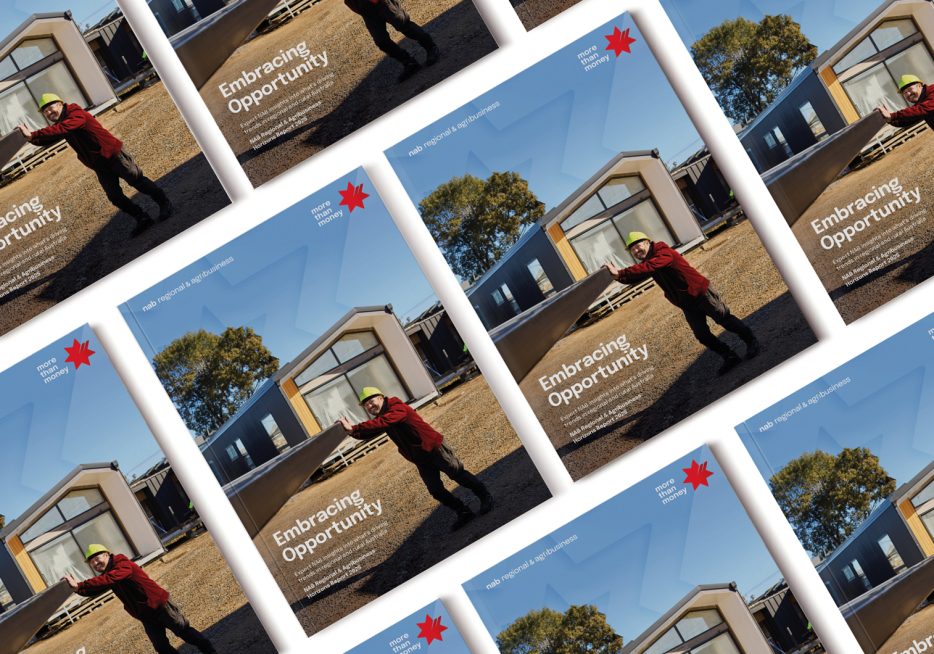Download the 2025 NAB Regional and Agribusiness Horizons Report: Embracing Opportunity for data-led insights on the state of play in regional and rural Australia and the economic outlook for the remainder of 2025.


Report
As Managing Director of Taylors Wines, Mitchell Taylor is steward of a family-owned company which was founded by his grandfather. Here, he explains how his passion for handing on a sustainable business inspired the creation of the world’s first carbon-neutral wine.

It’s almost 50 years since Bill Taylor and his sons bought 178 hectares of Clare Valley ‘terra rossa’ – a rich, red-brown loam over limestonep – with the aim of crafting exceptional wines. Today, Bill’s grandson Mitchell is continuing the family tradition as Managing Director of Taylors Wines.
He’s also deeply committed to passing the business on to the next generation in as good or better condition than when he took over the reins. “Our goal is to apply best practice principles in environmental management to all of our business activities and products,” he says. “For example, we used Eco-Mapping™ to create a framework for an Environmental Management System which now has ISO14001 certification. We’re very proud of this as it demonstrates our commitment to environmental stewardship.”
The company has practices in place to minimise waste and energy use, to reduce pollution and to support the conservation of land, water and biodiversity. And, in 2009, they set themselves the challenge of creating a 100 percent carbon-neutral wine. “The Eighty Acres range was the first to have its carbon footprint assessed using the international standard for life cycle assessment (ISO14044),” says Mitchell. “This enabled us to identify our supply chain ‘hot spots’ and implement changes such as reducing the packaging weight.”
“When Australia’s Ambassador for Climate Change hosted an official function as part of the 2009 Copenhagen Climate Change Conference, our Eighty Acres wines were served to the delegates,” says Mitchell. “We’ve also received a number of environmental awards, including the NAB Agribusiness Award for Environmental and Energy Management and the Banksia Foundation’s Leading in Sustainability Award.”
By December 2011, they had offset 2,700 tonnes of carbon emissions through Government Greenhouse Friendly accredited projects. They’d also achieved their goal.
In the past, practical experience was the only weapon against challenges such as drought, frosts, hail and disease. One of the biggest changes Mitchell has seen in recent years is an increasing reliance on science. “We have a team of trained viticulturists who are constantly testing and applying very innovative and scientific principles to eliminate disease,” Mitchell says.
“We’re also planning significant redevelopment of our vineyards to make sure each variety is planted in the best location, that we’re nurturing our old, established vines and that we’re sowing the right cover crops. It’s all about getting the balance just right so we’re not only bringing quantity off our vineyards but also the very best quality.”
The healthier the land, the better quality the wine, so sustainable practices can also bring significant commercial benefits, including an extra point of difference in the export market. “Many international buyers are very interested in our Eco-Mapping™ and some look for carbon neutral accreditation tender documents,” says Mitchell. “We’re also seeing a lot of interest in our commitment to best practice in the vineyard and the wine-making process, and also in how we deliver the wines to our end customers.”
His advice to other growers is, quite simply, to look after the land. “Sustainability is a continuous process,” he says. “But putting back what you take out makes good business sense now as it creates a valuable legacy for future generations.”
© National Australia Bank Limited. ABN 12 004 044 937 AFSL and Australian Credit Licence 230686.